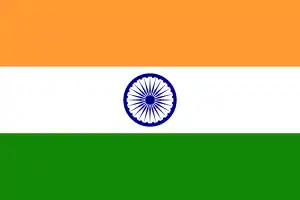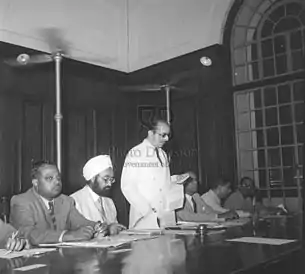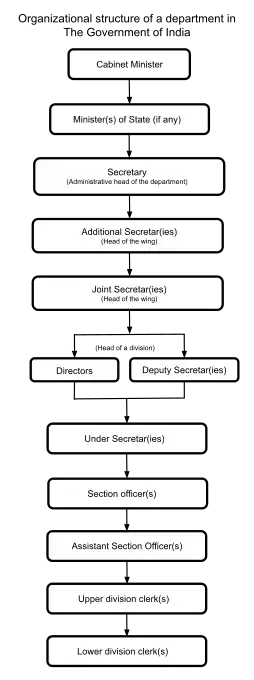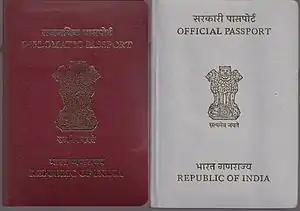Secretary to the Government of India
Secretary to the Government of India, often abbreviated as Secretary, GoI, or simply as Secretary, is a post and a rank under the Central Staffing Scheme of the Government of India.[6] The authority for the creation of this post solely rests with the Union Council of Ministers.[7]
| Union Secretary | |
|---|---|
 | |
 | |
| Government of India | |
| Member of | Committee of Secretaries on Administration |
| Reports to | |
| Seat | |
| Appointer | Appointments Committee of the Cabinet |
| Term length | No term length is imposed, except for Home Secretary and Defence Secretary.[1][2][3] Term extendable |
| Formation | 1930 |
| Succession | 23rd (on the Indian order of precedence.) |
| Salary | ₹225,000 (US$3,200) monthly[4][5] |
 |
|---|
| This article is part of a series on the politics and government of India |
|
|
The position holder is generally a career civil servant, mostly from the Indian Administrative Service,[4][8][9][10][11][12] and a government official of high seniority. The post of the secretary, however, is an ex-cadre post, hence, anyone can occupy it, but the office-bearers generally are either from All India Services (deputation; on tenure, after empanelment) or Central Civil Services (Group A; on empanelment). All promotions and appointments to this rank and post are directly made by the Appointments Committee of the Cabinet.
In the structure of the Indian government,[13][14][15] a secretary is the administrative head of a ministry or department,[16][17] and is equivalent to chief secretaries of state governments and Vice Chief of the Army Staff, Army commanders, and their equivalents in the Indian Armed Forces,[18] and are listed as such on the Indian order of precedence, ranking twenty-third.[19][20][21][22]
History

In mid-1930s, the Central Secretariat contained only twenty-nine secretaries,[23] who were all members of the Indian Civil Service. The salary for a member of this rank and post was fixed at Rs. 48,000 per annum in the 1930s.[23] As per warrant or precedence of 1905,[24] secretaries to the Government of India was listed together with joint secretaries to the Government of India and were ranked above the rank of chief secretaries of provincial governments.[24]
N. Gopalaswami Ayyangar had once suggested "[a] secretary should not be immersed in files and burdened with routine. It is essential that he should have time to grasp the overall picture, size up the problems facing the government in the field allotted to his charge, and think and plan ahead. All these are his proper functions and must be efficiently performed. Failure to make adequate provision in this respect cannot be compensated by a mere increase in the establishment under his control."[25]
The Administrative Reforms Commission visualised the role of secretary, primarily as one of a "coordinator, policy guide, reviewer, and evaluator."[25]
Powers, responsibilities and postings

A secretary to the Government of India is the administrative head of a ministry or department and is the principal adviser to the minister-in charge on all matters of policy and administration within the ministry or department.[17]
The role of a secretary is as follows:
- To act as the administrative head of the ministry or department. The responsibility in this regard is complete and undivided.[16]
- To act as the chief adviser to the minister on all aspects of policy and administrative affairs.[16]
- To represent the ministry or department before the Public Accounts Committee of the Parliament of India.[16]
The prime minister-led Appointments Committee of the Cabinet is the final authority on posting and transfer of officers of secretary level.[26] Secretaries report to their ministerial cabinet minister and to the prime minister.
Position
In the Indian government, secretaries head departments or ministries of the government and hold positions such as Finance Secretary, Defence Secretary, Secretaries under MEA, Home Secretary, Defence Production Secretary, members of the Railway Board and members of the Telecom Commission.
According to the report of the Seventh Central Pay Commission of India, seventy-three out of ninety-one secretaries to the Government of India are from the Indian Administrative Service.[4]
Emolument, accommodation and perquisites

All secretaries to the Government of India are eligible for a diplomatic passport. Secretaries are allotted either type-VII or type-VIII bungalows in areas like New Moti Bagh and Lutyens' across Delhi by the Ministry of Housing and Urban Affairs' Directorate of Estates.[27][28][29]
The salary and emolument in this rank is equivalent[18] to chief secretaries of state governments and to Vice Chief of the Army Staff, commanders and officers in the rank of full general, and its equivalents, in the Indian Armed Forces.[18]
| Base salary as per the Seventh Pay Commission | Pay matrix level | Sources |
|---|---|---|
| ₹225,000 (US$3,200) per month | Pay level 17 | [4][5] |
List of current secretaries to the Government of India
| Ministry | Designation | Name of secretary | Background | Batch |
|---|---|---|---|---|
| President’s Secretariat | Secretary to the President | Kapil Dev Tripathi | IAS officer | 1980[lower-alpha 1] |
| Vice President’s Secretariat | Secretary to the Vice President | I. V. Subba Rao | 1979[lower-alpha 1] | |
| Prime Minister’s Office | Principal Secretary to the Prime Minister | Dr. P.K. Mishra | 1972[lower-alpha 1] | |
| Special Secretary to the Prime Minister of India (Parliamentary Affairs) | Anil Kumar Gupta | 1986 | ||
| Cabinet Secretariat | Cabinet Secretary[lower-alpha 2] | Rajiv Gauba | 1982 | |
| Secretary (Coordination) | Dr. V. P. Joy | 1987 | ||
| Secretary (R) | Samant Goel | IPS officer | 1984 | |
| Secretary (Security) | Dr. V. P. Joy | Additional Charge | 1987 | |
| Agriculture and Farmers Welfare | Secretary (Agriculture, Cooperation and Farmers Welfare) | Shobhana K. Pattanayak | IAS officer | 1982 |
| Secretary (Agricultural Research and Education) | Dr. Trilochan Mohapatra | Scientist | — | |
| Secretary (Animal Husbandry, Dairying and Fisheries) | Tarun Shridhar | IAS officer | 1984 | |
| Atomic Energy | Secretary (Atomic Energy) and chairperson of the Atomic Energy Commission | K. N. Vyas | Scientist | — |
| AYUSH | Secretary (AYUSH) | Rajesh Kotecha | ||
| Chemicals and Fertilizers | Secretary (Chemicals and Petrochemicals) | P. Raghavendra Rao | IAS officer | 1985 |
| Secretary (Fertilizers) | C. Roul | 1985 | ||
| Secretary (Pharmaceuticals) | Aparna Subramani | 1982 | ||
| Civil Aviation | Secretary (Civil Aviation) | Pradeep Singh Kharola | 1985 | |
| Coal | Secretary (Coal) | Sumanta Chaudhury | 1985 | |
| Commerce and Industry | Secretary (Commerce) | Anup Wadhawan | ||
| Secretary (Industrial Policy and Promotion) | Ramesh Abhishek | 1982 | ||
| Communications | Secretary (Posts) | Anant Narayan Nanda | IPoS officer | 1982 |
| Secretary to (Telecommunications) and Chairperson, Telecoms Commission | Aruna Sundararajan | IAS officer | ||
| Consumer Affairs, Food and Public Distribution | Secretary (Consumer Affairs) | Avinash K. Srivastava | ||
| Secretary (Food and Public Distribution) | Ravi Kant | 1984 | ||
| Corporate Affairs | Secretary (Corporate Affairs) | Injeti Srinivas | 1983 | |
| Culture | Secretary (Culture) | Arun Goel | 1985 | |
| Defence | Defence Secretary | Ajay Kumar | 1985 | |
| Secretary (Defence Production) | Subhash Chandra | 1986 | ||
| Secretary (Department of Military Affairs) and Chief of Defence Staff | General Bipin Rawat | Indian Army | - | |
| Secretary (Defence Research and Development) and Chairperson, Defence Research and Development Organisation | Dr. G. Sateesh Reddy | Scientist | — | |
| Secretary (Defence Finance) | Gargi Kaul | IA&AS officer | 1984[31] | |
| Secretary (Ex-Servicemen Welfare) | Sanjeevanee Kutty | IAS officer | 1983 | |
| Development of North Eastern Region | Secretary (Development of North Eastern Region) | Navin Verma | 1982 | |
| Drinking Water and Sanitation | Secretary (Drinking Water and Sanitation) | Upendra P. Singh[32] | 1985 | |
| Earth Sciences | Secretary (Earth Sciences) and Chairman, Earth Sciences Commission | Dr. M. Nair Rajeevan | Scientist | — |
| Electronics and Information Technology | Secretary (Electronics and Information Technology) | Ajay P. Sawhney | IAS officer | 1984 |
| Environment, Forest and Climate Change | Secretary (Environment, Forest and Climate Change) | C. K. Mishra | 1982 | |
| External Affairs | Foreign Secretary | Harsh Vardhan Shringla |
IFS officer | 1984 |
| Secretary (East) | Vijai Thakur Singh | 1982 | ||
| Secretary (Economic Relations) | T. S. Tirumurti | 1985 | ||
| Secretary (West) | A Gitesh Sarma | 1982 | ||
| Finance | Finance Secretary & Secretary (Financial Services) | Rajiv Kumar | IAS officer | 1986 |
| Revenue Secretary | Ajay Bhushan Pandey | 1984 | ||
| Economic Affairs Secretary & Secretary (Investment and Public Asset Management) | Atanu Chakraborty | 1985 | ||
| Expenditure Secretary | Atanu Chakraborty(Addl. Charge) | 1985 | ||
| Food Processing Industries | Secretary (Food Processing Industries) | Jagdish Prasad Meena | 1983 | |
| Health and Family Welfare | Secretary to (Health and Family Welfare) | Preeti Sudan | 1983 | |
| Secretary (Health Research) | Dr. Soumya Swaminathan | Scientist | — | |
| Heavy Industries and Public Enterprises | Secretary (Heavy Industry) | Asha Ram Sihag | IAS officer | 1983 |
| Secretary (Public Enterprise) | Seema Bahuguna | 1983 | ||
| Home Affairs | Home Secretary | Ajay Kumar Bhalla | 1984 | |
| Secretary (Official Language) | Sailesh | 1985 | ||
| Secretary (States Council Secretariat) | Ruolkhumlien Buhril | 1984 | ||
| Secretary (Border Management) | Braj Raj Sharma | 1984 | ||
| Housing and Urban Affairs | Secretary (Housing and Urban Affairs) | Durga Shanker Mishra | IAS officer | 1984 |
| Human Resource Development | Secretary (Higher Education) | R Subrahmanyam | 1985 | |
| Secretary (School Education and Literacy) | Rina Ray | 1984 | ||
| Information and Broadcasting | Secretary (Information and Broadcasting) | Amit Khare | 1985 | |
| Labour and Employment | Secretary (Labour and Employment) | Heeralal Samariya | 1985 | |
| Law and Justice | Secretary (Justice) | Barun Mitra | 1987 | |
| Secretary (Legal Affairs) | Anoop Kumar Mendiratta | Judicial Service Officer | - | |
| Secretary (Legislative) | G. Narayana Raju | Indian Legal Service Officer | - | |
| Micro, Small and Medium Enterprises | Secretary (Micro, Small and Medium Enterprises) | Arun K. Panda | IAS officer | 1984 |
| Mines | Secretary (Mines) | Anil Gopishankar Mukim | 1985 | |
| Minority Affairs | Secretary (Minority Affairs) | Ameising Luikham | 1981 | |
| New and Renewable Energy | Secretary (New and Renewable Energy) | Anand Kumar | 1984 | |
| Panchayati Raj | Secretary (Panchayati Raj) | Amarjeet Sinha | 1983 | |
| Parliamentary Affairs | Secretary (Parliamentary Affairs) | Dr. RS Shukla | 1986 | |
| Personnel, Public Grievances and Pensions | Secretary (Personnel and Training) | C. Chandramouli | 1984 | |
| Secretary (Administrative Reforms and Public Grievances) | K.V. Eapen | 1984 | ||
| Secretary (Pension and Pensioners’ Welfare) | 1984 | |||
| Petroleum and Natural Gas | Secretary (Petroleum and Natural Gas) | Kapil Dev Tripathi | 1980 | |
| Power | Secretary (Power) | Sanjiv Nandan Sahai | 1986 | |
| Road Transport and Highways | Secretary (Road Transport and Highways) | Yudhvir Singh Malik | 1983 | |
| Rural Development | Secretary (Land Resources) | Anant Kumar Singh | 1984 | |
| Secretary (Rural Development) | Amarjeet Sinha | 1983 | ||
| Ministry of Railway (Railway Board) | Secretary ex-officio | Vinod Kumar Yadav | IRSEE | 1980 |
| Science and Technology | Secretary (Biotechnology) | Dr. Renu Swarup | Scientist | — |
| Secretary (Science and Technology) | Dr. Ashutosh Sharma | |||
| Secretary (Scientific and Industrial Research) | Dr. Girish Sahni | |||
| Shipping | Secretary (Shipping) | Gopal Krishna | IAS officer | 1983 |
| Skill Development and Entrepreneurship | Secretary (Skill Development and Entrepreneurship) | K.P. Krishnan | ||
| Social Justice and Empowerment | Secretary (Empowerment of Persons with Disabilities) | Shakuntala Gamlin | 1984 | |
| Secretary (Social Justice and Empowerment) | Nilam Sawhney | |||
| Space | Secretary (Space) and Chairperson, Indian Space Research Organisation | Dr. K. Sivan | Scientist | — |
| Statistics and Programme Implementation | Secretary (Statistics and Programme Implementation) | K. V. Eapen | IAS officer | 1984 |
| Steel | Secretary (Steel) | Raghvendra Singh | 1982 | |
| Textiles | Secretary (Textiles) | Ravi Capoor | 1986 | |
| Tourism | Secretary (Tourism) | Rashmi Verma | 1982 | |
| Tribal Affairs | Secretary (Tribal Affairs) | Deepak Khandekar | 1985 | |
| Water Resources, River Development and Ganga Rejuvenation | Secretary (Water Resources, River Development and Ganga Rejuvenation) | Upendra P. Singh | ||
| Women and Child Development | Secretary (Women and Child Development) | Rakesh Srivastava | 1981 | |
| Youth Affairs and Sports | Secretary (Sports) | Rahul Bhatnagar | 1983 | |
| Secretary (Youth Affairs) | Amarendra Kumar Dubey | 1982 | ||
| Notes | ||||
| ||||
Reforms
Media articles and others have argued in favour of lateral entrants being recruited to this rank/post to infuse fresh energy and thinking into an insular, complacent and archaic bureaucracy.[33][34][35][36]
Non-IAS civil services have complained to the Government of India because of lack of empanelment in the rank/post of secretary on numerous occasions.[4][8][9][10][11][12]
See also
References
- Khare, Harish (8 February 2005). "Fixed tenure planned for Home, Defence Secretaries". The Hindu. Retrieved 10 January 2018.
- "Fixed tenure for defence, home secretaries". Rediff.com. 22 September 2005. Retrieved 10 January 2017.
- "Fixed tenure for Defence, Home Secretaries". Outlook. 22 September 2005.
- "Report of the 7th Central Pay Commission of India" (PDF). Seventh Central Pay Commission, Government of India. Archived from the original (PDF) on 20 November 2015. Retrieved 13 August 2017.
- Biswas, Shreya, ed. (29 June 2016). "7th Pay Commission cleared: What is the Pay Commission? How does it affect salaries?". India Today. Retrieved 24 September 2017.
- "The Central Staffing Scheme" (PDF). Ministry of Personnel, Public Grievances and Pensions. January 1996. Retrieved 13 April 2016.
- "Only Cabinet can create Joint Secretary, above level posts". Press Trust of India. Retrieved 18 April 2017.
- Tripathi, Shishir (8 December 2015). "IAS: Emperor among the kings?". Governance Now. Retrieved 13 August 2017.
- Tikku, Aloke (15 January 2016). "Parity between IAS and non-IAS? The IAS will get to decide". Hindustan Times. Retrieved 13 August 2017.
- "Non-IAS bureaucrats now eligible for secretary-level posts". The Asian Age. 18 January 2016. Retrieved 13 August 2017.
- "Need Pay Parity With IAS Officers, Say Officials Of 20 Civil Services". NDTV. 30 June 2016. Retrieved 13 August 2017.
- Dastidar, Avishek G (14 January 2017). "Alleging bias, non-IAS officers petition PM Modi". The Indian Express. Retrieved 13 August 2017.
- "Part I of the Constitution of India- The Union and its territory - Article 1" (PDF). Ministry of Law and Justice, Government of India. Archived from the original (PDF) on 10 October 2017. Retrieved 15 January 2018.
- "Part XIV of the Constitution of India- Finance, Property, Contracts and Suits - Article 300" (PDF). Ministry of Law and Justice, Government of India. Archived from the original (PDF) on 3 December 2011. Retrieved 6 October 2017.
- "Part XIV of the Constitution of India- Services under the Union and the States - Article 312(2)" (PDF). Ministry of Law and Justice, Government of India. Archived from the original (PDF) on 3 December 2011. Retrieved 16 August 2017.
- Laxmikanth, M. (2014). Governance in India (2nd ed.). Noida: McGraw Hill Education. pp. 3.1–3.10. ISBN 978-9339204785.
- "Central Secretariat Manual of Office Procedure - 14th Edition (2015)" (PDF). Ministry of Personnel, Public Grievances and Pension. p. 6. Retrieved 15 November 2016.
- "Army Pay Rules, 2017" (PDF). Ministry of Defence, Government of India. 3 May 2017. Retrieved 24 September 2017.
- "Order of Precedence" (PDF). Rajya Sabha. President's Secretariat. 26 July 1979. Retrieved 24 September 2017.
- "Table of Precedence" (PDF). Ministry of Home Affairs, Government of India. President's Secretariat. 26 July 1979. Archived from the original (PDF) on 27 May 2014. Retrieved 24 September 2017.
- "Table of Precedence". Ministry of Home Affairs, Government of India. President's Secretariat. Archived from the original on 28 April 2014. Retrieved 24 September 2017.
- Maheshwari, S.R. (2000). Indian Administration (6th ed.). New Delhi: Orient Blackswan Private Ltd. ISBN 9788125019886.
- Kirk-Greene, A. (2000). Britain's Imperial Administrators, 1858-1966. New York City: Springer. ISBN 9780230286320.
- As per published records and book named "The India List and India Office List 1905" as published by India Office and India Office Records.
- Singh, Hoshiar; Singh, Pankaj (2011). Indian Administration (1st ed.). Delhi: Pearson Education India. pp. 104–126. ISBN 978-8131761199.
- "PM to oversee cadre allocation of bureaucrats, postings of joint secretaries and above". The Times of India. 21 August 2014. Retrieved 17 September 2017.
- "Compendium (RTI Act) – Government Residence (General Pool in Delhi) Rules" (PDF). Directorate of Estates, Ministry of Urban Development They are also eligible for Y+ security i.e of 4 Para commando and 18 Armed Forces. January 2013. Archived from the original (PDF) on 13 November 2014. Retrieved 21 July 2014.
- Gupta, Geeta (21 July 2011). "New homes for govt staff changing New Delhi". Indian Express. Retrieved 6 October 2017.
- Singh, Vijaita (16 September 2015). "Home Secretary gives the miss to fortified bungalow". The Hindu. Retrieved 6 October 2017.
- "Secretaries to the Government of India". Department of Personnel and Training, Government of India. 1 September 2017. Archived from the original on 3 March 2018. Retrieved 12 September 2017.
- Pubby, Manu (25 December 2018). "Rafale shadow: 2 senior MoD finance officers shifted out" – via The Economic Times.
- https://jalshakti-ddws.gov.in/whos-who
- Natarajan, Gulzar (13 April 2015). "Lateral entry, blind alley". The Indian Express. Retrieved 13 August 2017.
- Chandra, Shailaja (15 July 2017). "Should the government allow lateral entry into the civil services?". Hindustan Times. Retrieved 13 August 2017.
- "The need for lateral entry in civil services". Live Mint. HT Media. 19 July 2017. Retrieved 13 August 2017.
- Natarajan, Gulzar; Subbarao, Duvvuri (9 August 2017). "The case for lateral entry". The Indian Express. Retrieved 13 August 2017.
Bibliography
- Laxmikanth, M. (2014). Governance in India (2nd ed.). Noida: McGraw Hill Education. ISBN 978-9339204785.
- Maheshwari, S.R. (2000). Indian Administration (6th ed.). New Delhi: Orient Blackswan Private Ltd. ISBN 9788125019886.
- Kirk-Greene, A. (2000). Britain's Imperial Administrators, 1858-1966. New York City: Springer. ISBN 9780230286320.
- Singh, Hoshiar; Singh, Pankaj (2011). Indian Administration (1st ed.). Delhi: Pearson Education India. ISBN 978-8131761199.
- Verma, K.B. (1987). Readings In Indian Railway Finance. New Delhi: Mittal Publications. ISBN 978-8171881215.